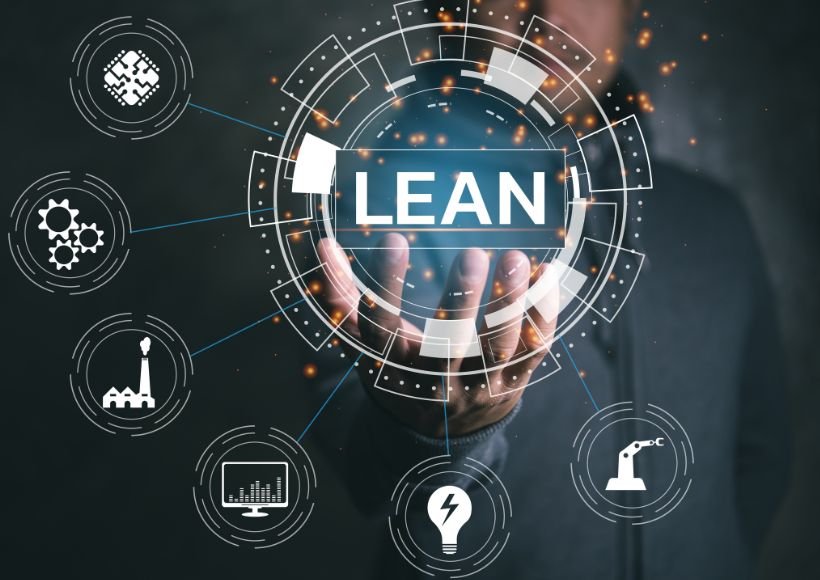Lean Management: The Efficient Management Model

Lean Management is a management ideology and procedure developed by the Toyota Production System (TPS) in the 1950s. It focuses on creating maximum customer value while minimizing waste in the organization’s operations. Lean Management aims to achieve higher efficiency, improved quality, reduced costs, and increased customer satisfaction.
Table of Contents
About Lean Management?
Lean Management is an organizational approach focused on continuous improvement through incremental process changes to enhance efficiency and quality. It aims to deliver customer value by optimizing resources and aligning workflow with customer demands. By recognizing and eliminating trash in business processes, Lean Management streamlines procedures. Initially rooted in manufacturing, this philosophy has since been adopted across various industries to drive productivity and customer-centricity.
Key Principles Of Lean Management
Value-Value Stream-Flow-Pull:
The core concept of Lean is to identify and understand the value that customers place on products and services. Organizations must then streamline the value stream (the series of activities required to deliver the product or service) to achieve a smooth workflow and eliminate bottlenecks. Work is dragged via the system based on customer requests, decreasing overproduction.
Continuous Improvement (Kaizen):
Lean Management highlights continuous improvement in all elements of the association. This involves encouraging employees to identify problems, suggest solutions, and implement incremental process changes regularly. Small, gradual improvements add up to significant gains over time.
Respect For People:
In Lean organizations, employees are valued, respected, and empowered. Leaders promote a culture of trust and encourage active participation from teams in decision-making. This involvement fosters employee engagement and motivation, creating a sense of ownership and commitment to continuous improvement.
Just-In-Time (JIT):
JIT is a fundamental aspect of Lean Management. It aims to produce or deliver goods and services at the precise moment required, neither too early nor too late. By adopting JIT, organizations reduce inventory costs and improve efficiency.
Jidoka (Autonomation):
Jidoka refers to building quality into the process, preventing defective items from being passed on to the next production stage. This concept empowers workers to stop the production process immediately if they detect any quality issues, ensuring that problems are addressed at the source.
Standardized Work:
Standardized work procedures in Lean organizations provide a consistent and structured task approach. By eliminating variations and establishing a clear baseline, it becomes easier to identify areas for improvement and implement changes that lead to higher efficiency and quality in the processes.
Visual Management:
Visual management involves cues like Kanban boards, charts, and indicators to provide real-time information about work status, progress, and potential issues. This enhances communication and enables quick decision-making.
Value Stream Mapping:
Value stream mapping is a technique used to analyze the current state of processes and identify waste areas. It helps in creating future-state techniques that are more efficient and useful.
Many Advantages Of Lean Managemen
Lean Management offers several advantages to organizations in their pursuit of efficiency and continuous improvement. Streamlining procedures and eliminating trash service decrease unnecessary costs and improve operating usefulness.
One key advantage of Lean Management is its emphasis on constant measurement and data-driven decision-making. This approach allows organizations to assess the impact of each change and improvement, leading to better-informed choices and a clearer understanding of performance.
Lean Management also fosters a culture of teamwork and employee empowerment. Affecting all organization members in problem-solving and decision-making develops a sense of privilege and engagement, teaching increased motivation and productivity.
Moreover, Lean Management promotes a detailed analysis of the entire business structure. This comprehensive examination enables organizations to identify potential failures and inefficiencies across all areas, allowing for targeted and effective solutions.
By embracing Lean principles, organizations move closer to total quality, delivering greater value to customers while minimizing waste. This approach doesn’t merely apply to the overall corporate business model but extends to every small action within the organization, optimizing operations at all levels.
Overall, Lean Management provides a systematic and sustainable framework for achieving excellence in performance and customer satisfaction.
Implementation Of The Methodology
Implementing Lean Management within the organization has proven to be a successful endeavour, driven by the commitment to efficiency and continuous improvement. The gradual approach, starting with employee training, has ensured that all staff members understand and embrace the principles of Lean. This shared understanding has facilitated the restructuring and improvement of internal processes, focusing on eliminating non-value-added elements.
Lean Management has fostered a cross-cutting culture of teamwork, promoting collaboration between departments and multidisciplinary teams. This has led to better communication, efficient planning, and workload distribution, ultimately reducing time investments and enhancing processes. The utilization of technology further contributes to the streamlining of operations.
The involvement of an external consultant specialized in Lean Management and agile project management has provided valuable support during the pilot projects, facilitating a smooth and effective transition. By gradually identifying and implementing common tools and shared work standards, the organization aims to continuously progress and integrate Lean principles naturally into its day-to-day operations.
Lean Management has proven to be a powerful tool that aligns with the company’s values and philosophy, enhancing efficiency, collaboration, and communication. Through this approach, the organization continues its improvement journey and remains committed to delivering value to customers while optimizing resources.
Final Words
Lean Management’s versatility allows its application in diverse industries like healthcare, service sectors, and software development. Embracing Lean guides promotes a culture of continuous advancement, addressing customer requirements efficiently. This enhances productivity, boosts competitiveness, and results in more effective and customer-centric organizations.
Also Read : How We Work In Web Project Management




